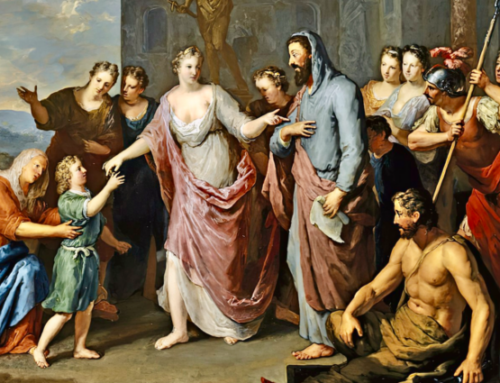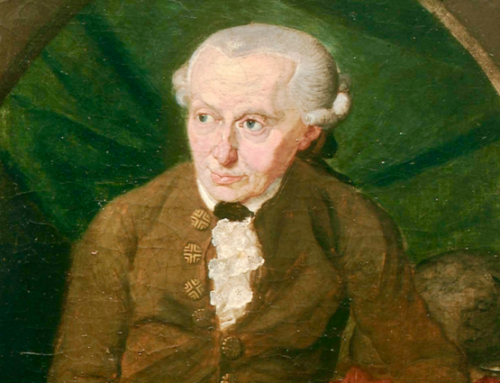 If you want to understand 98% of the unhappiness in the world — whether it is on the stage of international politics or the stage of your kitchen or bedroom, or wherever your arguments happen—consider the roots of resentment.
If you want to understand 98% of the unhappiness in the world — whether it is on the stage of international politics or the stage of your kitchen or bedroom, or wherever your arguments happen—consider the roots of resentment.
By resentment I mean something quite dark within the human heart. This heart of darkness is not just feeling bad because Henry got a bigger piece of pie or Sally called me a bad name. Instead it is the brooding review of a grievance (or a perceived grievance) over and over again in our minds. I call it a “Resentment Loop.”
In a grim inner monologue we rehearse a conversation in our mind… “Next time I’ll really tell her what I think…. I should have said thus and so…. He never should have done that. Next time I’ll teach him a lesson…. You wait and see.” This inner monologue is really an inner dialogue. We play out a scene with our nemesis over and over again in what can be an endless cycle of bitter resentment.
The Resentment Loop
I think most everybody has moments like that, but most people who are struggling for maturity move on. The Resentment Loop is no more than a way of venting or coping with a grievance. If the person has faith they learn how to hand it over to and seek forgiveness which breaks the Resentment Loop. They learn to give the other person the benefit of the doubt and to see their own Resentment Loop as an immature and prideful bit of stupidity.
To do so requires the uncomfortable virtue of humility and the difficult action and attitude of repentance. Unfortunately, not all of us can do that. In fact fewer and fewer members of our society are trained in the acquisition of such fundamentally contrary virtues. Instead we too often continue to run the Resentment Loop until we become addicted to it. It becomes “Our Precious.” We cling to the Resentment Loop.
One of the most insightful details in both Tolkien’s great saga and Peter Jackson’s film version is the portrayal of Gollum locked in a resentment loop—talking to himself and going over the same Resentment continually, like a beast licking its wounds or an addict in love with his drink or drug.
Why do we do allow ourselves to become addicted to the Resentment Loop?
We feed the addiction for the same reason we feed all addictions: because it feels good.
When we are in the Resentment Loop we are powerful again. We’re in control. We’ve told that other person exactly what we think. We’ve put him in his place. We’re on top of the world. We have the answers. We’ve shown him who’s boss. In the Resentment Loop we’ve got power and if we have been abused or hurt — if we are on the bottom of the heap or lack self esteem—if we’re down and out and lowly it feels great to be on top. When we’re in the Resentment Loop we’re on top, and that feels great.
The Downward Spiral
Now, here’s where it gets really interesting. Like all addicts, the high we get from the Resentment Loop doesn’t last. We need another fix and a bigger dose, so we let the anger grow within us and we start to generalize about the person who has hurt us. It’s not that white man. It’s all white men. It’s not that woman. It’s all women. It’s not that Muslim. It’s all Muslims. It’s not that Democrat or Republican or rich person or poor person. It’s all the people in that group.
Now the target of our Resentment is bigger, and the Resentment Loop is no longer a Resentment Loop—it’s a Resentment Spiral, getting ever wider and stronger in our minds. Now we are powerful and strong against all those people. We’re better than all those people. We’re the tops. We’re superior to them all!
Then the flip happens. The flip is when the Resentment stops feeling bitter and negative in our lives, and we start to perceive our precious as a good thing. This curse seems like a blessing. We see ourselves as a martyr to a cause.
At this point the resentment spiral becomes a source of self-esteem. It not only makes us feel good. Not only is our cause good, but we are good… and not only good, but superior to all others.
The next step in this addiction to the dark is that we search out other people who are locked into the same Resentment Loop—other people who also identify as their resentment. We either join a campaign, a political party, an activist group or a pressure group… or we start one. It becomes our life. It becomes our ideology. It becomes our false religion, our raison d’être, our very identity. At this point we have not only adored our precious, but we have been devoured by our precious.
Along with the others in the group we have something to live for. Our lives have meaning and purpose. We are righteous warriors and courageous campaigners. We might even do good things in our campaign. We might achieve justice. We might feed the hungry. We might bring down the mighty from their seat. We might do great things… but they will all have been achieved through Resentment and Hatred, not through charity and grace.
We can distinguish this sort of Resentment Campaign because once the gang of gollums win a battle they are not appeased. They can never be satisfied, just as Gollum and every addict can never be satisfied. If they do win a campaign, very often they will sabotage their success because they don’t really want to win. If they were to win, their Resentment Loop would be destroyed and their meaning and purpose in life—indeed their whole identity—would be destroyed.
That is why, if they do not sabotage their own success, they will immediately, on the heels of their success, launch into a new campaign. Any appeasement by their enemy will be tossed aside as they continue their campaign of hate—and it is a campaign of hate even though it is cloaked in faux victimhood, self-righteousness, and crybaby tactics.
Most frightening, those who are in the Resentment Campaign are invulnerable to criticism of any kind. They are right. They know they are right. They cannot be wrong. To be wrong in any way would be to undermine their Resentment addiction. They must be RIGHT. All. The. Time. If you dare to criticize— ven in the most diplomatic, gentle and kindly way—you will be rejected and cast down among their worst enemies, for the only person worse than the real enemy is the “friend” who betrays them by criticizing.
If you have read this far, you will have spotted these unhealthy behaviors in a whole range of political, religious, educational, and relational conflicts in our society. You see these behaviors within the family, within the school, the military, the parish, the church, the academy, within business and international relations.
It is everywhere. It is wherever people meet.
It is the heart of darkness in mankind, and it only takes a few moments’ thought to realize that this Resentment eventually leads to bloodshed because if the gang of gollums cannot bear criticism of any kind, neither can they tolerate the critics. If they are RIGHT, then they are good, and if they are good, then good people should destroy those who are WRONG because to be wrong is to be evil.
This is the true darkness at the heart of our present condition and why those who warn that the current crisis in our society will lead to tyranny and bloodshed should be heeded. They should be heeded because the gang of gollums will not be appeased and they will not compromise.
They will not because they cannot.
Fr. Longenecker’s book Immortal Combat – Confronting the Heart of Darkness explores these themes further.
The Imaginative Conservative applies the principle of appreciation to the discussion of culture and politics—we approach dialogue with magnanimity rather than with mere civility. Will you help us remain a refreshing oasis in the increasingly contentious arena of modern discourse? Please consider donating now.
The featured image is courtesy of Pixabay.







You forgot to include the final phase, when the person decides that even the gang isn’t good enough and turns on it for lack of purity.
One is minded of C. S. Lewis’ picture of Hell in The Great Divorce, where the inhabitants cannot stand to live near each other because, “Everybody’s wrong but me!”
Indeed. Thanks for your observation.
A brilliant article describing the process one goes through beginning with light resentments undealt with evolving into a resentment loop that is quite dark, sinister, and destructive in nature, not only consuming the host but consuming all others around the host. Excellent insight! I do feel this article could be better served with a part B: “For the unwitting soul getting caught into the initial stages of the resentment loop who wants to get out before its too late.” What insight might the author have regarding this? How do we rewire our brains in a culture caught in the resentment loop? The answers to this may appear obvious, nevertheless, tangible steps out of the loop might prove to be helpful for the person reaching for a lifeline…..
Lani: Good suggestion
Excellent article. This seems to be an apt description of Nietzsche’s Last Man.
Wow! and so true. Nietzsche observed the same thing, but for a different reason.